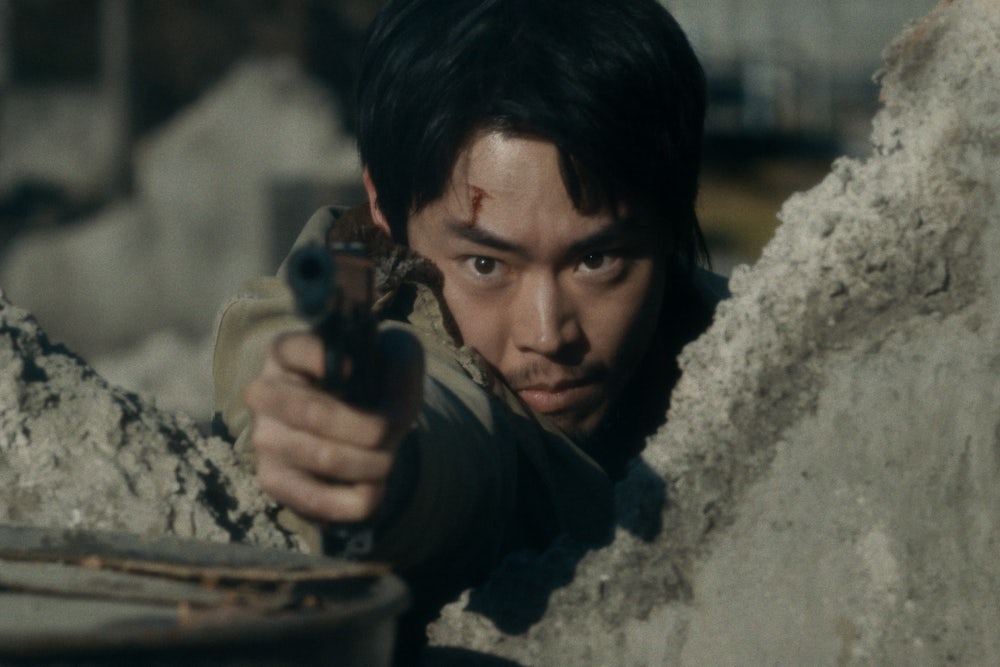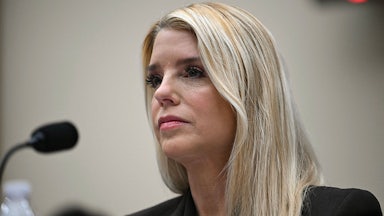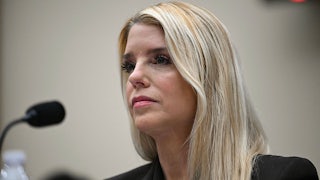There is nothing new under the sun, but Kiyoshi Kurosawa’s Cloud hovers somewhere in the vicinity. The Japanese master’s latest is a malevolent, cumulonimbus shapeshifter of a movie, a click-through consumer satire that’s darkly droll and also laugh-out-loud funny, charged with extremely online vibes and featuring an antihero bearing the (Posh)mark of Cain.
Cash-strapped and fed up, several years after acquiring his (useless) university degree, twentysomething Yoshii (Masaka Suda) laments his lack of “easy money”; he sulks through his shifts on a clothing factory floor, squirms uncomfortably at the prospect of a promotion, and tries his best to mollify his girlfriend, Akiko (Kotone Furukawa), a striver by proxy whose idea of making conversation is to whisper sweet nothings in his ear about their need for a bigger apartment. There’s no idealism in Yoshii’s psychological makeup, and no shame, either—just a set of what he refers to as “conventional desires” dangling carrot-like beyond his reach. His solution: a lucrative, legally flexible sideline as a digital middleman, purchasing trinkets in bulk from similarly flailing suppliers and reselling them online at jacked-up prices.
“You operate on impulse and instinct,” says one woman as Yoshii cruises coolly through her Tokyo warehouse, inspecting her inventory with calculating disdain. She doesn’t mean it as a compliment.
For his part, Yoshii isn’t offended. In fact, he’s already internalized the sentiment. His chosen online handle, “Ratel,” is another name for the honey badger, an animal that went viral in 2011 for not giving a fuck; whether the reference is intentional or just another way of saying “rat,” it distills a furtive, distinctly millennial grindset. The name also embodies the same tenacious, neo-Darwinian instincts glimpsed in Bong Joon Ho’s Oscar-winner Parasite, which Kurosawa’s film slots alongside nicely as a companion piece, or maybe a riffier, more dissonant B-side. Where Bong excels in a brawny, bravura form of crowd-pleasing—an approach that unfortunately failed him earlier this year in Mickey 17—Kurosawa isn’t afraid to be misunderstood. Unlike Parasite’s merry band of home invaders, Yoshii doesn’t see himself as a class warrior, nor is he bound by family ties. Rather, he’s very much his own crazy, nasty-ass animal, and perfectly happy to be perceived as vermin, provided he moves enough units. The key to Ratel’s scavenger persona lies in a combination of agility, anonymity, and furiously suppressed appetites, which sometimes get the better of him. He doesn’t want to let his eyes get bigger than his stomach; he knows that the worst thing he could do is to gnaw the invisible hand that feeds him.
The intricate interplay between impulse and instinct—and the carnage that ensues when those mechanisms go haywire, whether under external pressure or from the inside out—is an essential component of Kurosawa’s cinema. This was especially true of his 1997 breakthrough, Cure, a genuinely frightening study of free will whose psych-major villain weaponized his victims’ submerged grudges and secret desires. (The bad guy is a cheesy archetype—a sinister hypnotist—but the movie elides clichés; in a wicked twist, his subjects greet him almost gratefully, as a subconscious liberator.) Cure’s grim tone and savvy evocation of ’90s serial-killer signifiers—i.e., the gory x-marks-the-spot motif recasting crime scenes as expressionist canvases à la Se7en—made it an international hit; in retrospect, it serves as the dividing line in Kurosawa’s career between his extended apprenticeship as a willing and adaptable director for hire in the Japanese studio system in the 1980s and ’90s and a capital-A auteur traversing the festival circuit. His subsequent reputation as a genre specialist, buttressed by movies like Pulse, Retribution, and the aptly titled Creepy, belies the actual diversity of his twenty-first-century output, but it’s well earned: He’s peerless when it comes to manifesting menace.
Kurosawa’s style isn’t ostentatious, but his spare, functional setups get under your skin anyway. His camera—sometimes static, sometimes gliding, always intent—has the same nagging, disembodied presence as a phantom limb. Cloud’s early sequences are suffused with free-floating paranoia; riding the bus home from work with Akiko—who’s excited (and openly turned on) by her boyfriend’s plan for “a new life,” located out in the boonies and subsidized by more strategic gouging—Yoshii is so engrossed that he doesn’t clock a scruffy fellow passenger looming over his shoulder like an angel of death. When he turns suddenly to look behind him in a jarring reverse shot, the sound drops out, as if synced to the feeling in the pit of his stomach (and also ours). Nothing comes directly from this brief encounter (the other guy just gets off at his stop), but it nevertheless teaches us how to watch the rest of the movie—on a wavelength of steadily encroaching dread.
That’s Kurosawa’s frequency: No contemporary filmmaker is better at oblique threat, or at fusing physical and psychic architecture. Cloud is a film of cavernous and dilapidated interiors, densely cluttered but spiritually vacant spaces illuminated through frosted windows or fractured glass. The central, recurring image of shelves lined with cardboard boxes offers a sick parody of abundance—rows and rows of knockoffs waiting patiently to be unpacked, framing Yoshii himself as another piece of counterfeit merchandise. Where some genre filmmakers’ hermeticism feels sealed off from reality—variations on the neat-freak megalomania of Stanley Kubrick—Kurosawa works, steadily and patiently, toward the inverse. He takes us through the looking glass, darkly; his images seem to seal reality off from itself.
2024 was a banner year for Kurosawa, who released three excellent movies: an inscrutable, apocalypse-now short (Chime); a bleak, carefully torqued remake-slash-revision of his own ’90s DTV psychodrama (The Serpent’s Path), and Cloud, which is probably the most accessible of the trio—all things being relative—and was hailed last fall at festivals in Toronto, Venice, and New York as a “return to form.” Leaving aside the fact that Kurosawa’s form has never once abandoned him—his languid, measured filmmaking is as natural as breathing, and as mesmerizingly precise as a velvet-tipped metronome—there is a sense in which Cloud’s muscular genre pastiche represents both a directorial flex and a timely desire to revisit old terrain. Back in 2001, Kurosawa unleashed Pulse, a horror movie whose title hinted at a sociological agenda; its story of ghosts trapped in the machine—of lonely phantoms seeking dial-up connection and silhouettes of suicides screen-burned into the walls of apartments and chat rooms alike—monitored a society’s steadily declining vital signs. Cloud (another suggestive title, connoting a world of remote servers and ephemeral data collection) could be Pulse’s secular sequel. There are no literal hauntings here, and no blurry, wobble-walking apparitions, but the internet remains a portal toward something horrific nevertheless: an antisocial network of jilted customers spewing bile on message boards and eventually cosplaying as vigilantes in a campaign against the dirty rat(el) who knowingly sold them crap.
That it takes a while for Cloud to reveal its form as a best-served-cold thriller—with Yoshii getting hassled by cops and vandals alike after he arrives at his palatial, steel-and-glass fortress—is in keeping with Kurosawa’s fondness for methodical, elliptical storytelling. At the same time, approaching Cloud’s narrative from the perspective of cause-and-effect drama is a mug’s game. As he enters his seventies, Kurosawa’s magisterial control of film language obliges him to try to scramble its syntax; he’s more interested than ever these days in dream (or nightmare) logic and in cryptic, tactile abstractions that keep their meanings elusive (all the better for chasing them around).
To say that Cloud is a movie about the compulsive, hollowed-out shell game of late capitalism—with Yoshii/Ratel as its insatiable avatar—isn’t wrong, exactly, but it’s reductive: It’s equally acute as a study of the complex and very contemporary relationship that exists between online anonymity, technological surveillance, and rapidly metastasizing, reactionary-populist rage. In interviews, Kurosawa has talked a little bit about how Cloud’s shaggy-mad-dog plotting—which keeps extracting new antagonists out of the woodwork until the sheer proliferation of buyers with an ax to grind against Ratel becomes hilarious—conveys how small frustrations can become contagious. Yoshii’s remorseless grift provides his clients with a common enemy or effigy, suitable for burning (or a threatened “slow roasting” with an acetylene torch), but their anger transcends simple comeuppance. “In a sense,” writes Kurosawa in his director’s statement, “this might also be how modern-day wars come into being.”
The notion of doxing as a hypermodern form of warfare is provocative, and, within its genre-hopping conception, Cloud does transform into a kind of combat picture, albeit one where the rules of engagement keep mutating. As long as he’s hidden behind his modem and his pseudonym, Yoshii wields considerable power and influence (like Cure’s sociopathic manipulator, he knows what people want and preys on their weaknesses). Exposed and flushed out, though, he’s a cornered animal, flailing around helplessly in the woods (certain exterior locations and a sight gag involving a masked assailant in broad daylight suggest that Kurosawa is a fan of the Coen brothers’ masterpiece Fargo).
If Cloud were simply a cautionary tale (like Fargo), such dramatic turnabout might be taken on its face as fair play (a variation on the old parable of fuck around and find out), or as a necessary series of trials en route to some larger redemption. Suffice it to say that Kurosawa, who is not an ironist, is playing a different game entirely—and that game is definitely the operative word here. One late, extended set piece unfolds uncannily like a first-person shooter; from that bullet-riddled and blood-soaked moral void, it’s a short trip, metaphysically speaking, to a seductive rhetoric of pure evil, delivered—again, as in Cure—by a character who styles himself proudly as an enabler.
With his lanky frame and bland, slightly hateful handsomeness, Suda makes for a fine cipher. But the strongest impression in Cloud is made by the angelic Daiken Okudaira as Sano, a local college dropout whose loving devotion to Yoshii extends beyond the gig as his personal assistant-cum-henchman, and serves as an enigmatic running joke whose punch line, when it comes, is devastating. There’s no real reason that Sano gloms onto Yoshii, who mostly treats him with disdain and refuses to take his (good) advice about his business; he shuts down Akiko’s advances, accepts his severance pay gracefully, and tells his (now-ex) boss that he can always call if he needs help. This isn’t lip service; when Yoshii is placed in peril, Sano is—somehow—there, armed to the teeth, a crack-shot deus ex machina and a willing, lubricious cog within an even grander contraption. “Please keep focusing on only making money,” he says brightly to Yoshii when the shooting is over. “I’ll handle the rest.” To paraphrase another movie about a wretched mammal who finds a protector, the two of them need look no more. The end of the world as we know it is also the beginning of a beautiful friendship; every Cloud has its silver lining.










